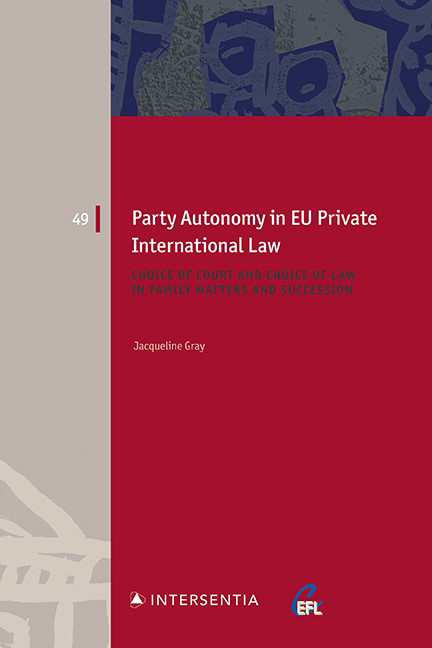 Party Autonomy in EU Private International Law
Party Autonomy in EU Private International Law Chapter 7 - Coordinating Provisions
Published online by Cambridge University Press: 25 May 2021
Summary
INTRODUCTION
The previous chapter presented the first step in examining the content of the choice of court and choice of law within the EU private international law framework on family matters and succession by outlining the direct connections through which party autonomy can be exercised in this setting. We now turn to evaluate the second type of provision found within this present framework: choice of court and choice of law provisions that allow related areas to be linked together (‘coordinating provisions‘).
Chapter 3 has outlined the potential problems concerning access to justice that arise from a lack of coordination and cohesion between the law and court, or between related subject areas in the cross-border context. Such related areas can be divided into two groupings of proceedings that oft en occur in conjunction with one another: (i) those that are connected with the dissolution of a marriage by divorce or legal separation or the dissolution of a registered partnership (proceedings dissolving the relationship, in conjunction with the dissolution of the property regime, maintenance and/or parental responsibility), and (ii) and those that arise upon the death of a spouse or registered partner (succession proceedings in conjunction with the dissolution of a matrimonial property regime or the division of the property of the registered partners). To summarise once more for the purposes of the present chapter, a lack of coordination in this regard may result in tangible problems such as having to travel between Member State jurisdictions to attend closely related proceedings within a short amount of time, and increased costs and complexity from the need to apply foreign law, as well as more subjective issues such as laws that are not compatible being applied to interlinked processes. Although such problems can be tackled to an extent by manually coordinating particular direct connections (as outlined in section 6.5.3. of the previous chapter), the EU legislator has also created provisions with the sole function of achieving coordination.
- Type
- Chapter
- Information
- Party Autonomy in EU Private International LawChoice of Court and Choice of Law in Family Matters and Succession, pp. 165 - 190Publisher: IntersentiaPrint publication year: 2021


